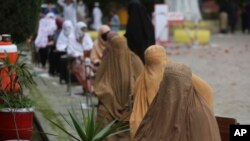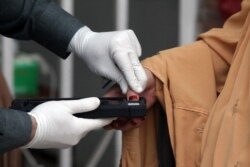Pakistan has begun delivering one-off cash payments of about $70 each to its 12 million poverty-stricken families, or roughly 80 million individuals, to alleviate the impact of the coronavirus-related economic shutdown in the country.
The roughly $90 million social protection response to the coronavirus was rolled out Thursday as the national tally of coronavirus infections increased to nearly 4,500, with at least 63 deaths.
Officials acknowledged the relatively low rate of cases, however, is because of the limited testing capacity, saying they expect the numbers to grow exponentially in coming days.
Pakistan detected its first case in late February and has since tested nearly 45,000 suspected patients.
“We anticipate our hospitals would come under immense pressure by the end of this month,” Prime Minister Imran Khan warned in nationally televised remarks Thursday.
In addition to uplifting traditionally ill-equipped hospitals, the Pakistani government has turned about 1,800 three-star and four-star hotels in the country into quarantine centers for COVID-19 patients.
With train service suspended in Pakistan, railway officials have converted air-conditioned sleeper and business class cars into medical wards, with a total capacity of 2,000 hospital beds as part of preparation to meet national requirements in the event of a major outbreak.
Relief package for poor
The coronavirus lockdown and restrictions have severely affected low-income households in a country where those in this category earn on average less than $2 a day, according to the World Bank.
The government has been faced with the difficult challenge of tackling a major pandemic outbreak on the one hand, while also trying to keep the troubled economy going to prevent a humanitarian disaster.
In most parts of Pakistan, public gatherings have been banned, schools closed, and all businesses shuttered other than those selling groceries or medicine.
Khan promised the lockdown restrictions would be eased gradually in some sectors to help resume economic activity, though they largely would remain in place.
The prime minister noted that labor class, daily wage earners, vendors and small shopkeepers were being hit particularly hard by the economic shutdown and the government would review the situation next week. Khan hoped his emergency cash-transfer program would help mitigate the suffering of poor families.
Sania Nishtar, who heads the relief program, said the government has established 17,000 points across Pakistan that include special protective measures to facilitate the cash payments.
She noted that emerging evidence suggested the coronavirus reportedly could push half a billion people into poverty.
“The government of Pakistan has acted swiftly to extend social protection to 12 million families [80.4 million individuals],” Nishtar tweeted.
The government was using biometric technology, among other modern means, to deter misuse of the funding, she added.
Critics have hailed the economic relief initiative in a country where nearly 40 percent people live in poverty.
“The government has started the largest and most comprehensive program of providing financial support to the poor and marginalized segments of the society. This is an expression of compassion for the needy,” said Raoof Hasan, the chief executive of Islamabad-based Regional Peace Institute.





